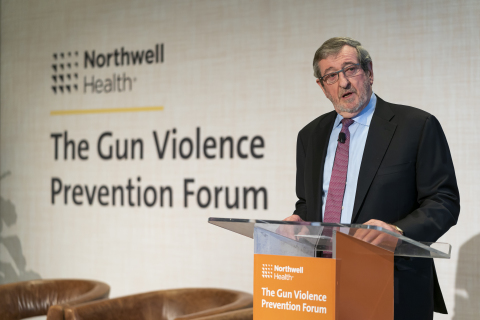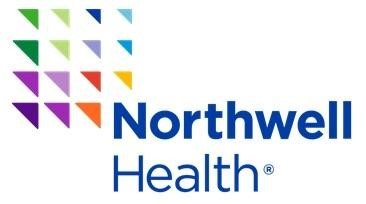Major Health Systems to Collaborate on Gun Violence Solutions
Major Health Systems to Collaborate on Gun Violence Solutions
New interactive forum unites health care organizations looking to combat public health crisis
NEW HYDE PARK, N.Y.--(BUSINESS WIRE)--With President Biden unveiling executive actions on Thursday to strengthen gun safety following mass shootings in Colorado and Georgia, Northwell Health announced today that numerous health care networks have joined its campaign to recognize gun violence as a public health crisis and identify solutions aimed at reducing the bloodshed.
Northwell’s newly established Gun Violence Prevention Learning Collaborative for Health Systems and Hospitals is a multiyear, interactive and apolitical forum that seeks to share and develop best practices for preventing firearm injury and death. More than 300 individuals, including executives, clinical leaders, researchers and other health care workers from CommonSpirit Health, University of Chicago Medicine, Massachusetts General Hospital, University of Arkansas Medical Sciences Medical Center, and other hospitals and health systems have joined the Learning Collaborative. Most members of the Collaborative, who will begin meeting on April 20, signed on to the campaign before the ongoing crisis jumped to national prominence again with the recent mass shootings of 10 people, including a police officer, in a Boulder supermarket, and eight in Atlanta massage parlors.
“President Biden’s executive actions are an important first step in confronting a public health emergency that is killing tens of thousands of people every year. The recent killings in Boulder and Atlanta underscore the reality that gun violence is an epidemic that is not going away on its own,” said Northwell President and CEO Michael Dowling, who pledged $1 million in 2019 to create the health system’s Center for Gun Violence Prevention, led by pediatric trauma surgeon Chethan Sathya, MD. “As health care providers who have been on the front lines of battling the coronavirus pandemic for the past year, we have an obligation to set aside political concerns, and devote time and resources to identify solutions that will help curtail this senseless violence. By working together, sharing best practices and promoting ongoing dialogue, our goal is to develop action plans that can be put in place in our local communities to reduce the risk of further bloodshed.”
“Gun violence is preventable – and as health care providers who deal daily with these senseless tragedies, we must commit to addressing this problem in a preventive way, and not just after the fact,” said CommonSpirit Health CEO Lloyd H. Dean. “At CommonSpirit Health, we have dedicated almost $30 million to design and implement community-based violence prevention programs as part of our Violence and Human Trafficking Prevention and Response Program, a holistic model for responding to violence using a patient-centered approach that connects those who have been victimized by violence with ongoing care and resources. The time to focus solely on the aftermath of gun violence is over. We in health care must commit the resources to lead the way when it comes to prevention of gun violence.”
“The University of Chicago Medicine health system has been collaborating with community partners and elected officials for many years to address the social determinants of health and to interrupt the cycle of gun violence, but we know we can and must do more,” said Tom Jackiewicz, president of the University of Chicago Medical Center, which recorded a 47 percent increase in trauma volume last year. “No single entity can tackle this public health crisis alone — gun violence is our collective challenge to address. Through this collaborative, we will listen to, learn from, and work with each other to identify and develop effective interventions that will ultimately save lives in the communities we serve."
Noting that Arkansas ranks eighth out of 50 US states in gun-related deaths, Stephen Mette, MD, CEO of the University of Arkansas for Medical Sciences (UAMS) Medical Center, said, “I do not believe gun violence or how we reduce it are 2nd Amendment issues. Americans have constitutional protections for gun ownership. Our Constitution helps define who we are as nation, as a society. But we must also acknowledge that there are too many guns in the hands of too many people who should not have access to them because of risk to themselves or others.”
Peter Masiakos, MD, co-director of Massachusetts General Hospital Center for Gun Violence Prevention and director of pediatric trauma services at the MassGeneral Hospital for Children, added, “The MGH Center for Gun Violence Prevention is pleased to join this diverse group of health care providers to focus on reducing injuries and deaths related to firearms and to promote safety in the home and in the community through clinical care and education, community engagement and research.”
Gun violence hit historic highs in 2020, including 611 mass shootings (defined as four or more people shot and/or killed in a single event) and 43,530 gun-related deaths, according to the Gun Violence Archive. To address gun violence holistically, the new Learning Collaborative will bring hospitals, health systems and like-minded community organizations to the table for an open dialogue and collaboration, as well as opportunities to utilize the lessons learned by others to help drive strategies within their respective organizations.
Each of the three year-long phases contain monthly seminars and breakthrough sessions, including talks from medical experts, community organizations, law enforcement, public health and policy, and survivors. Topics include teaching firearm safety, clinical screening for firearm injury and collaborating with schools.
The initiative’s first phase will open the conversation and foster a collaborative environment by listening to key members of gun violence prevention efforts, identify strategies currently in action, as well as any barriers holding prevention back. The second phase will apply those strategies and the third will evaluate the work.
“We need to view the victims as more than statistics -- they are individuals, family members, friends and loved ones,” said Dr. Sathya, director of Northwell’s Center for Gun Violence Prevention and a pediatric trauma surgeon at Cohen Children’s Medical Center. “Only with action will we be able to bring justice to victims and their families, and help their communities avoid the same tragedy. Regardless of where they live, Americans are at risk. What we’ve seen across the country, even amid the COVID-19 pandemic, is a call for help. Health care organizations need to take action and make prevention a priority.”
Hospitals and health systems interested in joining the Learning Collaborative can visit: northwell.edu/GunViolencePreventionLearningCollaborative
About Northwell Health
Northwell Health is New York State’s largest health care provider and private employer, with 23 hospitals, 830 outpatient facilities and more than 16,600 affiliated physicians. We care for over two million people annually in the New York metro area and beyond, thanks to philanthropic support from our communities. Our 76,000 employees – 18,900 nurses and 4,800 employed doctors, including members of Northwell Health Physician Partners – are working to change health care for the better. We’re making breakthroughs in medicine at the Feinstein Institutes for Medical Research. We're training the next generation of medical professionals at the visionary Donald and Barbara Zucker School of Medicine at Hofstra/Northwell and the Hofstra Northwell School of Nursing and Physician Assistant Studies. For information on our more than 100 medical specialties, visit Northwell.edu and follow us @NorthwellHealth on Facebook, Twitter, Instagram and LinkedIn.
Contacts
Barbara Osborn
516-321-6777
bosborn@northwell.edu

